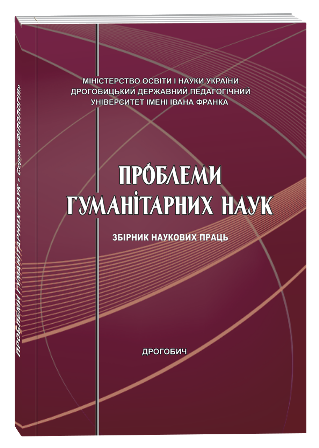THE MODEL OF LINGUISTIC PERSONALITY OF A CHARACTER IN ORIGINAL AND TARGET LITERARY TEXTS (BASED ON THE UKRAINIAN TRANSLATION OF DONNA TARTT`S NOVEL “THE GOLDFINCH”)
DOI:
https://doi.org/10.24919/2522-4565.2023.58.6Keywords:
linguistic personality, literary character, literary text, verbalisation of concepts, levels of linguistic personalityAbstract
The article examines the particularities of rendering the components of a three-level model of a character's linguistic personality (LP) in a literary work based on the Ukrainian translation by V. Shovkun of Donna Tartt's novel «The Goldfinch.» As a result of the conducted study, the main components of Boris Pavlikovsky's LP at each of the three levels were identified, as well as the methods of their reproduction in the translation, namely: 1) at the verbal level: specific lexical choices, use of foreign words and non-normative vocabulary, lexical and grammatical errors; 2) at the cognitive level: verbalisation of concepts known to the average American but unknown to the character (local dishes, TV shows, cars); verbalisation of concepts known only to the character (the character teaches the protagonist to eat bread with sugar, talks about «praznyky» held in Ukraine on Christmas Eve, compares languages, etc.); 3) at the pragmatic/motivational level: the desire to be independent and free, the desire to make a statement, the ability to compromise with one's conscience, etc. It was found that the main difficulties arise when reproducing the verbal level of the character's linguistic personality due to the impossibility of preserving most of the lexical and grammatical errors in their speech, among which are the absence of articles, auxiliary verbs, and subjects. The character's speech in the translation generally conforms to the norms, whereas for the English-speaking reader, the character is foreign at the lexical and grammatical levels. The study shows that it is precisely through the reproduction of the components of the cognitive and pragmatic/motivational levels of the linguistic personality model, which encompass its worldview, that the character in the Ukrainian translation of the novel retains its authenticity and depth.
References
Дика Н. М. Мовна особистість : міждисциплінарний аспект. Педагогічна освіта : теорія і практика. Психологія. Педагогіка. 2017. № 27. С. 4–8. URL : http://nbuv.gov.ua/UJRN/Potip_2017_27_3.
Засєкіна Л. В. Мовна особистість у сучасному соціальному просторі. Соціальна психологія. 2007. № 5 (25). С. 82–90.
Іваницька М. Л. Особистість перекладача в українсько-німецьких літературних взаєминах : монографія. Чернівці : Книги − ХХІ. 2015. 607 с.
Наняк Ю. О. Індивідуалізоване мовлення як проблема перекладу (на матеріалі трагедії Й. В. Гете “Faust” та її англомовних і українських перекладів) : автореф. дис. ... канд. філол. наук : 10.02.16. Київ. 2018. 20 c.
Славова Л. Л. Мовна особистість лідера у дзеркалі політичної лінгвоперсонології: США–Україна : монографія. Житомир : Вид-во ЖДУ, 2012. 360 с.
СПИСОК ДЖЕРЕЛ ІЛЮСТРАТИВНОГО МАТЕРІАЛУ Тартт Д. Щиголь : роман / пер. з англ. В. Шовкуна. Харків : Книжковий Клуб «Клуб Сімейного
Дозвілля», 2016. 816 с.
Tartt D. The Goldfinch. New York: Little, Brown and Company, 2013. 480 p.



